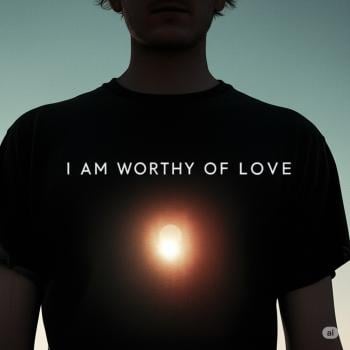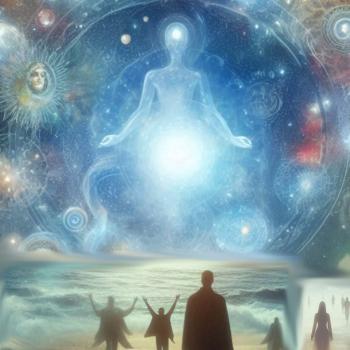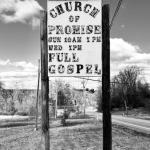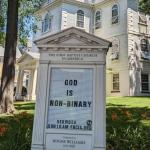Part 3 of Daddy, why is there God? series
Do you ever wonder why bad things happen to us? We’re going through our daily life and bam, a brick falls on our head!
We’re diving deep into this question that puzzles every person alive, “Why do bad things happen to us?” Does God design these things into our lives for some mysterious purpose? Can logic explain this or is it beyond our ability to even imagine?
It seems like God could prevent most bad things from happening. What’s up with God, anyway? What is God’s role in our lives?
It’s odd that our beliefs put God on a very high pedestal. We worship God. We believe God is the author of our lives and has the power to control events. Theologically, we believe the Most High God, the all-powerful God, is omnipotent, omnipresent, and omniscient. What do these words mean, and do they even matter in real life?
These words mean God is above all other gods, all powerful, is present everywhere, all the time knows everything, and can create and control everything. And God not only knows everything, God even knows what is going to happen.
Making statements like these open our critique of God to logic. Is God bad god if God doesn’t help us? Or is God nonexistent?
When bad things happen to us, what are we expected to do with it? Are we just supposed to be hapless victims and just accept it and move on? Even dogs turn on their masters if mistreated. How do we explain our ability to dismiss such treatment and dismiss it as the mysteries of God?
Podcast show links with added content: Substack, YouTube video, Spotify, and Apple podcasts. These appear a day after blog-article posts.
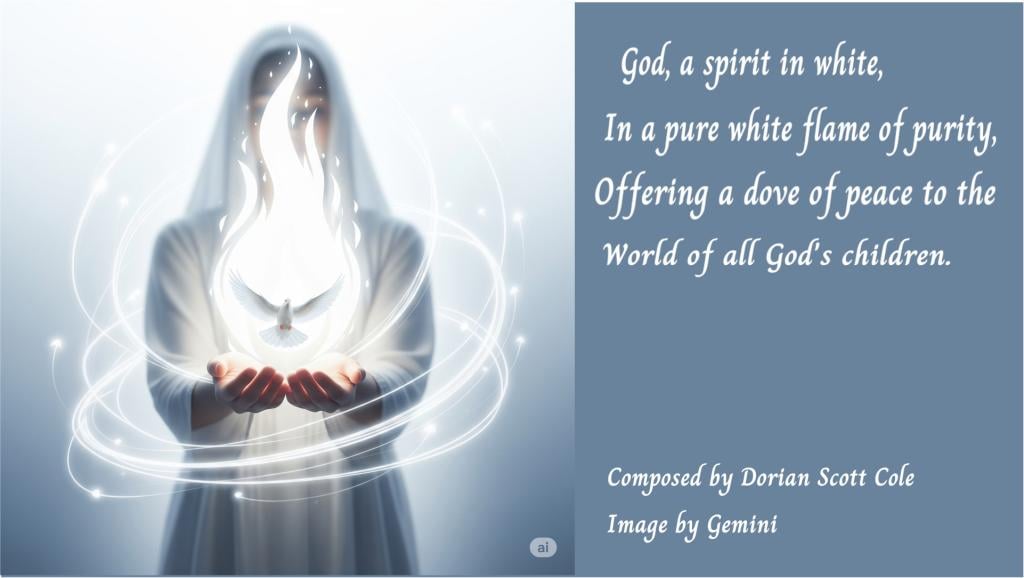
composed by Dorian Scott Cole, image by Gemini.
Consider this Bible Verse
“Away with the noise of your songs!
I will not listen to the music of your harps.
But let justice roll on like a river,
righteousness like a never-failing stream!” – Amos 5:23-24 (NASB)
In this verse the prophet Amos gives a message from God saying that God is sick of people ignoring justice while going to the Temple and singing praises to God. This is not what God wants. God wants action from us. He wants us to fix injustice.
Is God subject to human logic, especially philosophical logic?
The use of logic creates a logical dilemma. God is love, but are harmful things an expression of love? Maybe tough love is meant to toughen us up?
God knows when something bad is about to happen and can prevent it from hurting us, right? Then why doesn’t God do so?
If there is a plan for each of our lives, do these plans include suffering? Is there a greater plan by all of humanity that we are a part in? Do life plans get disrupted by accidents and evil in the world? Does God allow needless suffering?
Near Death Experiences (NDEs) indicate we plan our life before we come to Earth. Do we plan to suffer horrible experiences?
We mostly can’t see the answers to these questions. Seeing the answers likely would interfere with the plan. A better question to ask, instead of what we expect from God, is, “What does God expect from us?” And a related question, “What can we learn from our experiences?”
We can’t hide from the reality that sometimes experiences are too painful to learn from. Sometimes our breath, sense, and ability to cope are knocked out of us. We can only cry in pain to God, not reason for philosophical answers. But we learn.
Faith and logic intertwine in mysterious ways. The essence of belief often transcends the realm of logic, drawing us into a space where trust reigns. Yet, exploring such profound questions leads us to wrestle with the paradoxes of our existence. Rather than seeking definitive answers, perhaps the journey lies in exploring these questions themselves—the process of asking, reflecting, and growing.
The Bible verse from Amos challenges us to focus on justice and righteousness. We are urged to act rather than be passive. This emphasis signals a divine partnership, a call to co-create a world aligned with higher principles.
For some, the very idea of co-creation with God is a bridge too far. Our lives are mostly about family and career choices. We want to be part of the bigger picture. We want there to be some higher purpose for our lives. But fear and trembling is our natural response to our God who is beyond our ability to grasp and be part of, even if pain is wrapped in love.
Life is a tapestry woven with threads of joy and suffering. Right now we see the knots on the backside. We don’t see the beautiful tapestry until the end. Whether planned or unplanned, our role is to find meaning within these threads. We have to learn and become the values of justice, compassion, and humility that truly define humanity and God’s love for all.
What does God expect from us? What can we learn from our experiences?
The problem with logic
I dared cite logic even though faith may not be logical. We can use logic to endlessly argue points, and we do. But classical propositional logic is binary, only offering true and false evaluations of statements. It’s like science that works with the observable world. It doesn’t allow nuances, exceptions, and doesn’t offer any new information or resolution. So we’re stuck with a yes or no binary answer.
I’ll give you one example. Sports coaches all have their personalities and styles. Autocratic coaches tell you exactly what to do, and may micromanage you. They will conform your game to their experience of what works. Democratic coaches enable players to develop on their own and involve players in the decision-making process. Other coaches provide minimal guidance and get involved only when necessary. From the point of view of logic, which coaching style should be voted “true?”
Each coaching style has weaknesses and strengths. They all work. They are all true. But they don’t lend themselves to logic.
Life is very nuanced with a vast number of parameters to take into consideration. People have free will and do unexpected things. But even if God does know the outcome, does that mean that God should intervene?
Amos 5:23-24 puts the onus squarely on us to make things right.
Shall we live the life of a pet?
I know some people who want to come back as a cat or dog, be loved, and never have a bad moment. Many of them deserve to be treated this way in a true paradise like Adam and Eve were. But is this really what we crave as human beings?
Did Adam and Eve seek to live a life of leisure? Or did God create them to be experimenters who wanted to explore life and gain knowledge of good and evil?
Knowledge of good and evil comes with a high price tag. But we insist on taking the challenge. We come into this life wanting to experience life. Young adults who have experienced the thrills of life often ask, “Is that all there is?”
That’s a profound question. Is jumping off a cliff or high building with wings the height of what life has to offer? No. There is much more. Life is a much deeper and richer experience than the thrills at the beginning.
We have to ask ourselves, “would we be content living the life of a pet in paradise. And then, what would that make us?”
Our partnership with God
As we mature, we are able to take on more responsibility. We want to feel connected to something beyond ourselves and feel we are contributing to our world. Opportunities abound.
One of the fundamental principles I teach is a slogan at the bottom of every blog and article: “Our answer is God. God’s answer is us. Together we make the world better.” I mean exactly that. God is not the author of evil. We are co-creators with God. And God allows us to suffer the consequences of our actions and asks us to reconcile with those we hurt, or help others avoid pain.
I’ll give you some examples of helping others avoid pain:
When people die in a car accident, instead of asking God why God let that happen, we need to look at what caused the accident and design cars and highways so that it doesn’t happen again. That’s our call to action from God.
Many are already working on automobile driving safety. They improve car designs so they don’t explode on impact, have fronts that crush and seat belts and air bags to prevent bodily damage. We and God work together to fix it.
Many are already working on this. They improve car designs so they don’t explode on impact. They have fronts that crush and seat belts and air bags to prevent bodily damage. Highways are equipped with guard rails to prevent head on collisions, and cars are getting lane detection for driver inattention. Self-driving cars are better drivers than many on the road.
When people are harmed mentally, physically, or financially by others, they respond by helping the police get them into custody so they don’t harm others, and possibly get restitution.
When earthquakes destroy villages, scientists develop earthquake, volcano, and tsunami warning systems that alert people ahead of time so they can escape to safety. This is social justice and our call to action.
When the earth is suffering drought and widespread fires, people take action to impede climate change. This is the social justice the prophets and Jesus called us to.
When people die of disease, it compels others to create cures so more don’t suffer. This is the social justice the prophets and Jesus called us to.
When injustice in government actions, laws, and economic systems impact those without adequate resources for living, we try to make it right. This is the social justice the prophets and Jesus called us to.
Each tragedy is a call from God to make it right or make it better. It’s not a call to look up and say why did you let this happen? Then brush it off saying, “Everything happens for a reason.” Doing something is an act of love. Love is why we are here. God is love.
Of course, there are always those who risk their own lives just for fun. I never got that attitude. To me life is too precious to waste on a thrill. Tragically some of them die.
Part of my answer is, I think there is a plan for each of our lives, but humans often short-circuit the plan through injustice and human indifference, leading to disaster for one or all. God doesn’t control people so they don’t do things that hurt others. Disaster is a call to action to each of us to fix it or make it better.
Does the tragic event wreck the plan for our lives? We don’t know. With God, all things are possible.
Conclusion
If we consider the following statement, does this change our perspective:
“We are in a universe governed by nature. Nature is bound by laws of physics, and that means environmental change. We are part of the physical world, and sometimes nature hurts us and other living creatures. Our physical environment doesn’t give consideration to people, so tragedies happen.
We may have chosen our experiential path for learning more about love, or God may have chosen it for us – we don’t know for certain.
People are not controlled by God. We aren’t puppets on a stage. We all learn from bad deeds that hurt others and good deeds that help others. The choice is ours and so are the consequences. Consequences teach us. God guides but doesn’t interfere. Our life plan may be interrupted, but with God all things are possible.”
What does God expect from us? What can we learn from our experiences?
Coming in this series, next we’ll explore mysticism, agnosticism, and whether there is a divine group of powerful figures in Heaven, and heavens.
“With hate, we have more to lose than gain – break the cycle” – Dorian Scott Cole
“Our answer is God. God’s answer is us. Together we make the world better.” – Dorian Scott Cole
Probability Space
What probability spaces can we open in our minds to acknowledge that when bad things happen, it’s up to us to fix it?
(A probability space is where all of the elements necessary for something to happen are present, the moment is pregnant with possibility, and a new something is almost inevitable. All it takes is intention.)
Potential Space
If you think creatively and allow your mind to wander and explore, can we accept the challenges the world places before us and initiate or support efforts to make things better for everyone?
Would love to hear your thoughts in the comments below. This helps me improve my work.
Please subscribe to my Patheos Newsletter.
Below is information for church planning to minister to new generations, building a community of action, service opportunities, education opportunities for new generations, and descriptions of the author’s nonfiction books.
Some things that you might love
Would love to hear your thoughts in the comments below. This helps me improve my work.
Please subscribe to my Patheos Newsletter.
Below is information for creating change in my new book, Unleash Movements that Matter: Break Through Barriers to Change.
My new book. Unleash Movements that Matter: Break Through Barriers to Change.
My new book, Unleash Movements that Matter: Break Through Barriers to Change, which I wrote for new generations, I research and explain in great detail what it takes to create change in our world. (An audio presentation is in progress.)
Ministering to New Generations – strong impact course
How can churches minister to new generations if they won’t come to church? The church has been losing people at 1% a year, and now most of new generations won’t come.
I developed and presented a course on understanding and working with new generations. I would like to say I had rave reviews, but on a scale of 1 to 5 it averaged 4.5. Well, some people were raving.
The course helps people understand new generations, their values, and their differences. It helps people understand how to build a bridge to them and minister to them. The old worn-out things we used to do don’t work, and for good reason. This solutions focused course enables people to find new ways, appropriate ways, to minister to these generations in their local circumstances. It’s for church groups and generates deep discussion.
Free video preview of the course
Course on Udemy: Understanding and Working with New Generations
________________________
– Dorian
Our answer is God. God’s answer is us. Together we make the world better.
Restore and recreate. Take time to celebrate life. Laugh, sing, and dance regularly, even every day. Happy. This is why we dance to celebrate life: Reindeer actually running and dancing.
Building a Community of Action
New Way Forward community
Can we make positive change in our world and end a lot of suffering?
Helen Keller, who was both blind and deaf, said: “Although the world is full of suffering, it’s also full of the overcoming of it.”
The human spirit yearns for a world without suffering, but it’s through facing challenges that we progress. The world isn’t perfect, but together we can create a future with less hardship. Famine, discrimination, gun violence, and injurious economic and educational disparities are complex problems, yet understanding their root causes empowers us to find solutions.
Launching in first quarter 2025, the New Way Forward community will connect individuals seeking practical solutions and creating lasting change. We’ll focus on understanding problems and their solutions, and how to effectively create change.
Join us in building a brighter tomorrow! New Way Forward on Facebook.
Civic service opportunities
Do Unto Others Kindness Campaign, and civic engagement.
United Methodist Church Volunteer Opportunities.
Join or support Zero Hour and amplify the voices of youth organizing for climate action.
Peoples Hub. Resistance, Resilience, Restoration, Re-imagination. Online Popular Education. For movement workers to learn, connect, collaborate, and strategize – in and across the disability justice and solidarity economy movements.
Stakeholder Capitalism – a video podcast series from the World Economic Forum. Can capitalism be made to work for all of us – and to improve rather than destroy the state of the planet?
General service and aid opportunities (on One Spirit Resources Website). To add your service opportunity to the One Spirit Resources list, contact the author (me) through Facebook Messenger. Note that I only friend people I know.
————————————–
Education Opportunities for new generations
Becoming an Entrepreneur – MITx online
Evaluating Social Programs – MITx online
_______________________
Bible scripture verses are New American Standard Version (NASB), unless noted.
_______________________
Author and books
New Generations Walk with Jesus: Newer generations feel unloved, alone, lost, stressed, and are searching for a deeper spiritual connection that they don’t find in the church. This book draws on fifty years of the author’s quest to understand people, religion, and spirituality, and his work with many denominations. It provides a deep analysis of pressing questions these generations have, without denominational baggage.
Appease the Volcano: What does God require from people? The voices of the ancients from many religions echo much of the same things: It starts with law, then mercy and forgiveness, then love. Love is a major emphasis in all major religions and replaces law.
The Prophetic Pattern: Ancient and Modern Prophecy: How to distinguish the intent of various types of prophecies and oracles, both ancient and modern.
Preparing For the Future Of Work and Education: Analysis of the kinds of jobs that AI and Robotics will displace, and the educational requirements for them. AI will replace or augment thirty percent of jobs. This is an in-depth analysis citing many authoritative sources.
Author Website: Dorian Scott Cole




